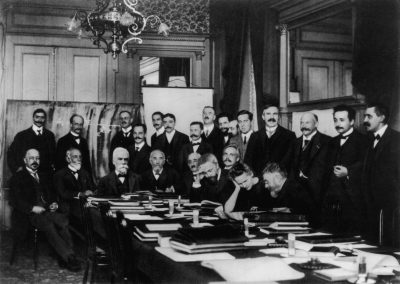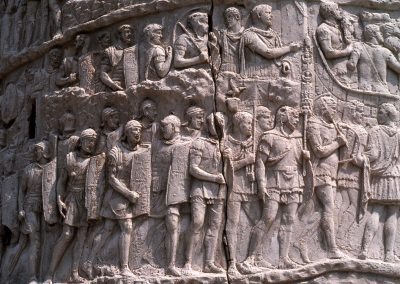
Intellectual Legitimacy
Photo: Klaus Schwab, Founder of the World Economic Forum, makes an appearance at Davos. Photo by Evangeline Shaw.
This is the first essay in my series on intellectual legitimacy. Read the next essay here.
Which ideas shape society? Why have ideas and systems such as ‘Christianity’, ‘natural selection’, ‘Marxism’ or ‘general relativity’ been so influential? A myriad of answers have been proposed, ranging from the “marketplace of ideas” to Hegelian dialectics to top-down narrative management to the arc of moral progress, and more.
Anyone who hopes to change society through their ideas bases this hope on an answer to this question. The success of such plans depends on getting the right answer. There might be a handful of cases when someone is in a position to shape society without communicating any aspect of their ideas. But these cases seem to be the exception, the rule being that for an idea to shape society it must be communicated. There are many technical challenges to communicating ideas, and one of the more important ones is applying a gears-level understanding of how people evaluate ideas.
The first thing to realize is that it is both difficult and time-consuming to fully understand new ideas and evaluate them on their own merits. Sometimes, it is socially risky as well. As such, people will often instead evaluate the intellectual legitimacy of new ideas.
An idea has intellectual legitimacy insofar as it is recognized by society as respectable and reasonable. An intellectually legitimate idea does not need to be recognized as credible by all people, or even by very many people at all. There only needs to be a general perception that society at large holds the idea to be legitimate. Powerful institutions and individuals are seen as tolerating or endorsing it. Such a perception isn’t necessarily coupled to whether an idea is true.
Oftentimes, perception of legitimacy is directly connected to who is communicating the idea or how the idea is communicated. Does the communicator have the authority to be taken seriously on the topic? The Environmental Protection Agency (EPA) can declare vehicle emissions above a certain level to be unsafe for human health, Bill Gates can pontificate on the future of technology, and a physicist at Harvard can announce new facts about the cosmos. Notice that each of these communicators has authority within a limited domain. Although the EPA could issue claims about fundamental physics, those claims would not gain the same recognition as they would if published by a Harvard physicist. Conversely, that Harvard physicist could write an environmental impact assessment for your next construction project, but it wouldn’t be recognized by a court as legally relevant.
There are different theories for the mechanisms behind idea spread. Oftentimes we hear about the marketplace of ideas, a model which compares the spread of ideas to a market and which suggests that ideas will rise or fall in accordance with their truth and validity. Memetics is a different model, suggesting that ideas will instead rise or fall in accordance with their ability to spread among hosts. The “egregore“ is a third model, proposing that idea complexes behave as organisms and pursue their own interests.
All of these models neglect, however, that individuals routinely use legitimacy as a shortcut for evaluating the quality of the ideas around them. What may intuitively feel like evaluating an idea on its merits has oftentimes already factored in how an idea is communicated, and who is communicating it. We do this because it is harder for us to assess claims in fields that are outside our areas of expertise and so, instead, we learn from experience which sources to rely on. Evaluating an idea’s intellectual legitimacy is often safer and easier than evaluating the idea itself, and in a healthy society, the shortcut works. This makes the shortcut an efficient and effective heuristic for individuals. Even then, though, an intellectually valid idea that is correctly perceived as legitimate might ultimately still turn out to be false. Examples include solid but since-disproven scientific hypotheses such as phlogiston or the plum pudding model of the atom.
This shortcut is so common we could argue that intellectual legitimacy is one of the foundations of power in our society. Control of the landscape of legitimate policies and measures is important, but even more important is who has the legitimacy to implement policies and measures. It is possible to amass authority in one area and spend it in another. The political economist Max Weber concluded that modern civilization was actively being remade by what he termed “legal-rational” authority, which displaced charismatic and traditional authority in Western civilization throughout the modern period.
What does the role of intellectual legitimacy look like in the many institutions that define our lives? Consider a scientific study demonstrating a particular new medicine to be safe and efficacious. An FDA official can use this study to justify the medicine’s approval, and a doctor can use it to justify a patient’s treatment plan. The study has this legitimacy even when incorrect. In contrast, even if a blog post by a detail-oriented self-experimenter contained accurate facts, those facts would not have the same legitimacy: a doctor may be sued for malpractice or the FDA may spark public outcry if they based their decisions on reports of this sort. The blog itself would also risk demonetization for violating provider terms of service, which usually as a matter of policy favors particular “authoritative” sources.
A stark example of this is YouTube’s COVID-19 Medical Misinformation Policy, which plainly states that “YouTube doesn’t allow content that spreads medical misinformation that contradicts local health authorities’ or the World Health Organization’s (WHO) medical information.”
For another example, the edit history of the Wikipedia page on the book Why We Sleep is full of back-and-forth edits both adding and removing references to Alexey Guzey’s essay critiquing the book’s claims, all while preserving references to a discussion by Columbia University statistician Andrew Gelman which directly cites Guzey’s work and praises its carefulness. Yet neither Guzey nor Gelman is a sleep scientist. The difference? As the edit history describes, Guzey has “no association to any academic institution,” so per Wikipedia’s official policies, his essay simply could not be cited directly. Once Guzey’s work had “now been the subject of a BBC Radio 4 episode,” however, references to it were added back for good.
How can intellectual legitimacy grow detached from truth or intellectual validity? Society’s perception of legitimacy can be incorrect, sometimes even when available information easily disproves views still held to be legitimate. This is because perception is outsourced to various authorities—sometimes independently prominent individuals, but most commonly to institutions and those acting as their representatives. It takes live players or practitioners of living traditions of knowledge to orient such institutions towards the truth. Incentives inside of old, automated organizations are at best weakly coupled to truth, and at times actively push against it. What do such incentives look like in practice?
Consider a manager selecting between two applicants, the first with a Harvard degree and the second without. Even if the manager has learned that the second applicant is more qualified for the job, in many workplaces it would be more prudent for the manager to choose the first applicant. If the manager passes up the first applicant in favor of the second, but the second underperforms, it is the manager who is in trouble for a poor hiring decision. But if the first candidate underperforms, the manager has an excuse: they trusted the Harvard degree! Whether it was the correct choice or not, the manager’s hiring decision will not be seen as impulsive or irresponsible. Enough iterations of such choices could completely decouple legitimacy and merit from each other.
Bureaucracies are especially influenced by the perceived legitimacy or illegitimacy of knowledge. Oftentimes bureaucracies have been constructed in such a way as to only recognize certain pre-existing bureaucratic markers of legitimacy as valid. The tenure committee recognizes papers published as valid indicators of a professor’s academic success, but not blog posts with the same information and reach. The American Medical Association recognizes the M.D. as a valid license to practice medicine. The schoolteacher recognizes the published novel, but not the web serial, as a valid book to read for the student’s homework assignment.
Markers of legitimacy have a strong impact on the way ideas are used and decisions are made, simply because the more legitimate a piece of knowledge is, the more an individual person in society can use that idea to justify decisions. For a good idea to have the most impact, that idea cannot just be freely available – that idea also needs to achieve legitimacy. This means that legitimacy is a necessary prerequisite for an idea to spread to wide audiences and become mainstream.
We’ve now seen that legitimacy can be affected by at least two factors: who communicates an idea and how it is communicated. We’ll explore both in later essays.
Read the next essay in this series on intellectual legitimacy here.





